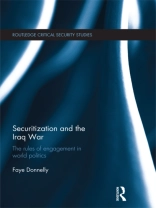This book critiques the conceptualization of security found in mainstream and critical theoretical debates, and applies this to the empirical case of the 2003 Iraq War. The Iraq War represents one of the most puzzling, complex, and controversial events in the post-Cold War era. The manner in which the Bush administration finally decided to hold Saddam Hussein accountable through military intervention provoked a worldwide outcry due to the narratives they constructed to justify the "pre-emptive use of force" and "enhanced interrogation techniques." Responding to constructivist and post-structuralist scholars’ calls for a turn to discourse, and aligning its argument with critical security studies, particularly the Copenhagen School (CS), this book conceptualizes language as a pivotal mechanism of power. Adopting a Wittgensteinian approach, it moves away from thinking about the nexus between security and language from a single action, or speech act, to a series of actions or interactions. To illustrate this new approach, the author examines two cases in particular: the UN inspectors’ finding that there was no credible evidence that Iraq possessed weapons of mass destruction (WMD) in early 2003 and the Abu Ghraib scandal in 2004. Both events show that the boundaries and relations between securitized rules and environments are not pre-given but produced in a particular language game. This book will be of much interest to students of critical security studies, US foreign policy, and IR in general.
Faye Donnelly
Securitization and the Iraq War [EPUB ebook]
The rules of engagement in world politics
Securitization and the Iraq War [EPUB ebook]
The rules of engagement in world politics
Купите эту электронную книгу и получите еще одну БЕСПЛАТНО!
язык английский ● Формат EPUB ● страницы 208 ● ISBN 9781135131883 ● издатель Taylor and Francis ● опубликованный 2013 ● Загружаемые 6 раз ● валюта EUR ● Код товара 2774683 ● Защита от копирования Adobe DRM
Требуется устройство для чтения электронных книг с поддержкой DRM












